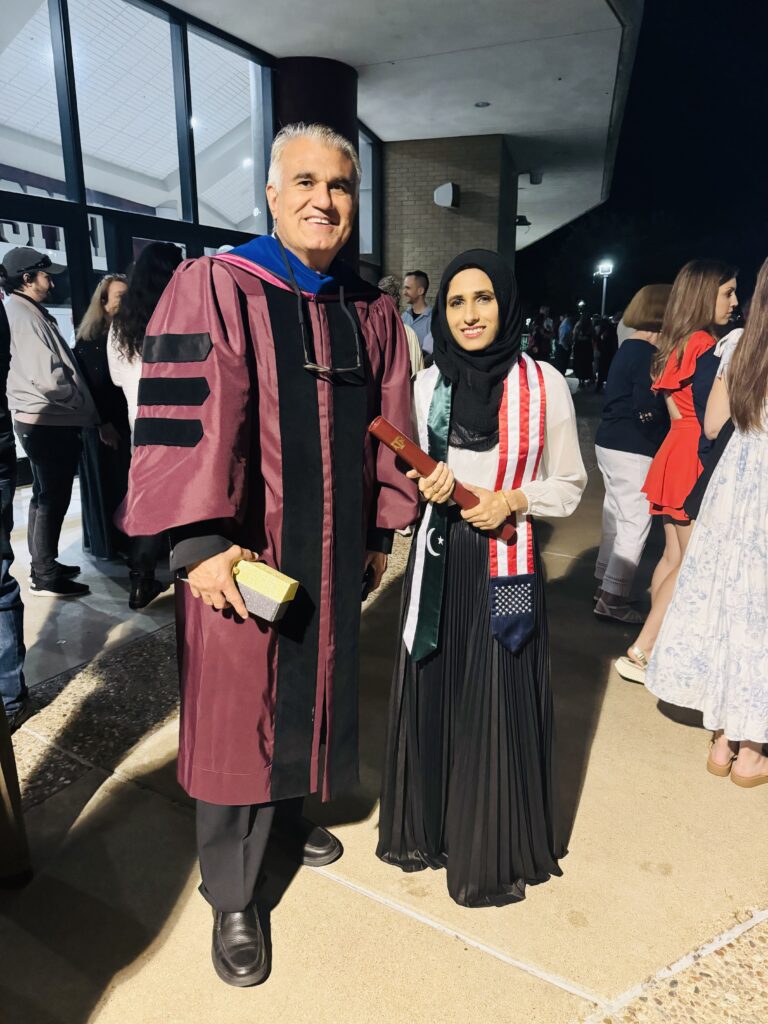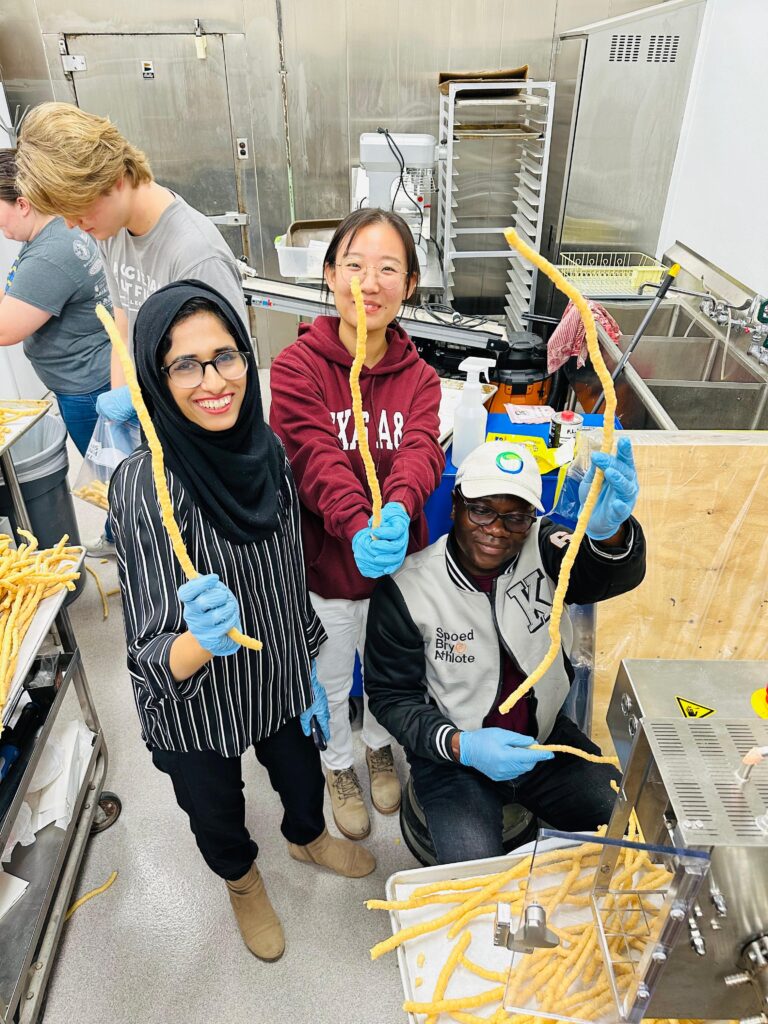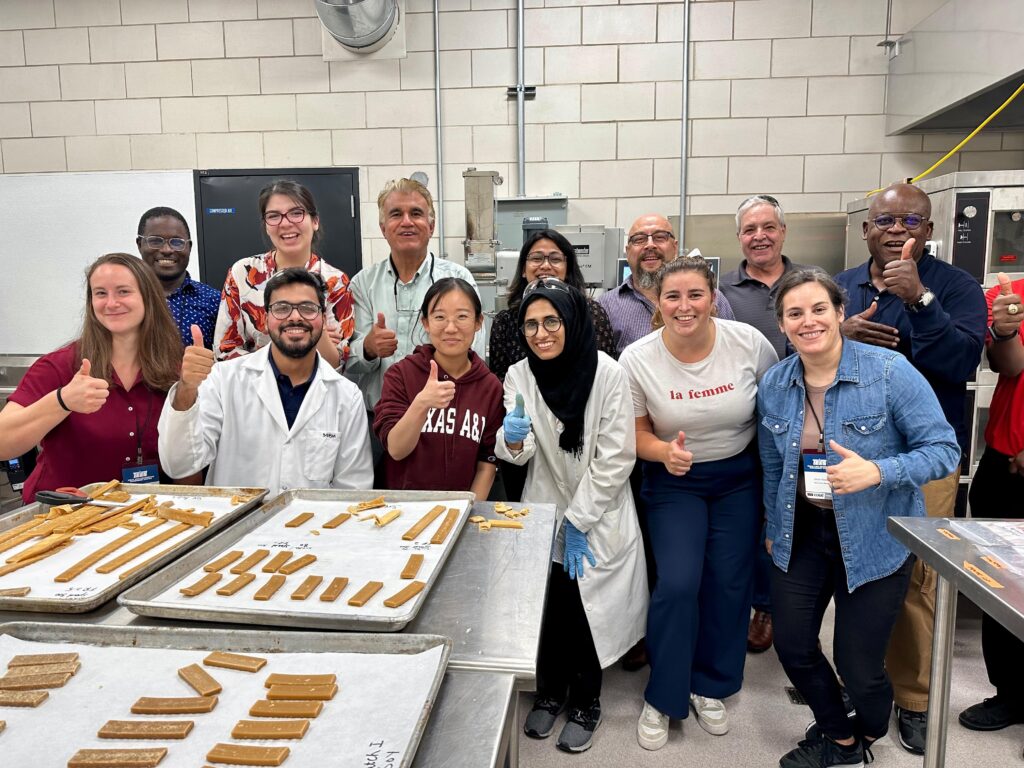Ph.D. student Fariha Irshad ’24 driven by parent’s aspirations, personal determination

Originally from Pakistan, graduate student Fariha Irshad in the Department of Food Science and Technology had a lot of motivation in coming to the U.S. to expand her studies.
“Embarking on the journey to pursue a Ph.D. in food science and technology at Texas A&M was not just a personal choice, but also a realization of my late father's and my mother's shared aspiration for my higher education,” Irshad said.
Irshad said her interest in pursuing food science and technology at Texas A&M University started with her earlier studies in food and nutrition, where she learned about how food affects our health.
“This got me curious about the science behind food and its impact on human nutrition,” she said.
Instructors who influenced her academic journey
Irshad, who earned her doctoral degree in food science and technology this spring, said her decision to dive deeper into this field was solidified by the program's top-notch reputation, which was further reinforced by its commitment to cutting-edge research and a faculty consisting of internationally recognized experts.
She cited associate department head and extrusion expert, Mian Riaz, Ph.D., as one of those internationally known experts.

“Dr. Riaz’s international reputation proceeds him,” she said “The prospect of working with him in an environment dedicated to advancing knowledge in the field, especially in the area of plant-based meat, was a compelling factor in my decision to choose Texas A&M.”
She also noted that department head, Joseph Awika, Ph.D., who served as her “co-chair on this academic journey,” also played a pivotal role.
“His expertise in cereals and pulses provided the perfect combination to transform my ideas into reality, particularly in the context of my work on plant-based meat,” she said. “Dr. Awika's constant inputs, particularly in working with pulses and overcoming their limited functionalities, have been instrumental in making them functionally viable components of plant-based meat.”
She said Awika's extensive background in using fundamental and applied scientific tools to enhance knowledge of grains as sustainable and health-promoting food components had a profound impact on her own research interests and pursuits.
Another instructor she singled out as having a profound impact on her was Rhonda Miller, Ph.D.
“Dr. Miller's profound expertise in meat quality, safety, and utility has significantly influenced my academic journey,” she said. “Her research on various aspects of red meat, such as its composition, palatability, and quality, along with her innovative work on automated grading technology and the use of non-meat ingredients to improve the shelf-life and safety of red meat, has greatly shaped my understanding of food science.”
Irshad added that Dr. Miller's extensive experience as the director of research and development at Monfort, Inc., where she developed numerous meat products, provided a valuable real-world perspective to her teachings.
“During my first year of Ph.D. studies, Dr. Miller’s interest in and knowledge of the sensory evaluation of food left a lasting impression on me,” she said. “Her profound knowledge and effective teaching style, coupled with her supportive demeanor, sparked my interest in the sensory evaluation industry.”
Irshad said in collaboration with her academic advisors they conceptualized the idea of developing plant-based meat from pulses such as peas, lentils, and fava beans and conducting sensory tests on them.
She said the program's exceptional reputation, coupled with the expertise of its faculty members, has not only expanded her knowledge but has also provided a platform to contribute meaningfully to the evolving landscape of food science.
Lessons for personal and professional success
Irshad said her educational journey at Texas A&M has been a rich source of lessons that hold profound implications for both personal development and future success.
“A major lesson is recognizing the transformative power of persistence and adaptability,” Irshad said. “Facing the challenges inherent in academic pursuits has underscored the importance of resilience and the ability to adjust course in response to evolving circumstances.”
She also noted the importance of cultivating effective communication skills and embracing collaborative approaches.
“Interacting with diverse perspectives within the academic community, particularly under the guidance of influential instructors, has highlighted the pivotal role of clear communication and cooperative teamwork in fostering a conducive learning environment.”
Irshad said the academic diversity in the program provided her with a valuable lesson in the art of interdisciplinary thinking.
“The ability to integrate knowledge from various fields enhances problem-solving capabilities and equips me with a holistic understanding of complex issues,” she said. “In essence, the lessons garnered from my tenure at Texas A&M encompass resilience, effective communication, collaborative proficiency, and the merits of interdisciplinary thinking. These lessons serve as pillars supporting my ongoing development and contribute significantly to the foundation for potential success in my future endeavors.”
Plans for a food science career
Irshad said her post-graduation career journey will involve a focused entry into the field of food auditing and certification, leveraging the comprehensive knowledge and skill set acquired throughout her academic journey.

“My hands-on experience in working with plant-based meat, texturized vegetable protein, and meat analogs, particularly in the context of extruder technology, has equipped me with a nuanced understanding of innovative food processing methods,” she said. “And my commitment to quality assurance is underscored by the coursework I undertook in HACCP -- Hazard Analysis and Critical Control Points -- and supply management. These courses have fortified my grasp of essential principles in ensuring food safety and optimizing supply chain processes.”
Irshad said she aspires to contribute to the field of food science and technology by implementing and upholding rigorous food production standards. Her aim, she said, is to bring a meticulous approach to assessing and validating food production processes, ensuring compliance with regulatory requirements and industry best practices. She also plans to integrate her expertise in supply chain management to optimize operational efficiency and contribute to sustainable practices within the food industry.
“My future plans revolve around a strategic entry into the dynamic field of food auditing and certification, wherein I intend to apply my diverse skill set and knowledge base to elevate industry standards and contribute to the seamless integration of sustainable practices in food production and supply chain management,” she said.
Irshad’s advice on overcoming challenges
Irshad said goal-setting and maintaining sincere motivation are pivotal elements on the path to academic and personal success.
“If you're considering graduate school in food science and technology, set clear goals, find a supportive advisor, and make sure your living environment supports a positive overall experience,” she said. “Graduate school requires self-motivation and determination and the resilience developed during individual hardships can be a catalyst for personal and academic growth.”
She added the transformative impact of a robust support system, such as the one provided by Texas A&M, can help turn challenges into a stepping stone toward success.

For those considering entering the field of food science and technology, my advice is to diversify your skill set to gain expertise in various facets of the field, such as food processing technologies, quality assurance, and supply chain management,” she said. “Actively seek hands-on experiences through internships or research projects to complement theoretical knowledge and build a robust professional network.”
She also emphasized the importance of being informed about trends, embracing continuous learning, cultivating relationships, and exploring interdisciplinary opportunities to broaden one’s perspective. “Above all, stay passionate about the field,” Irshad said. “Taking initiative, being proactive, and maintaining a genuine enthusiasm will set the stage for a fulfilling and successful career in food science and technology.”

Finally, despite personal hardships, Fariha persevered through the demanding rigors of her Ph.D. program while raising her son, Aliyaan Ayub, as a single parent. The unwavering support from the Texas A&M community, friends, and especially the love and assistance of her mother and brother, proved pivotal in shaping her journey. Her son and her goals made her more resilient and stronger, helping her achieve her dreams.